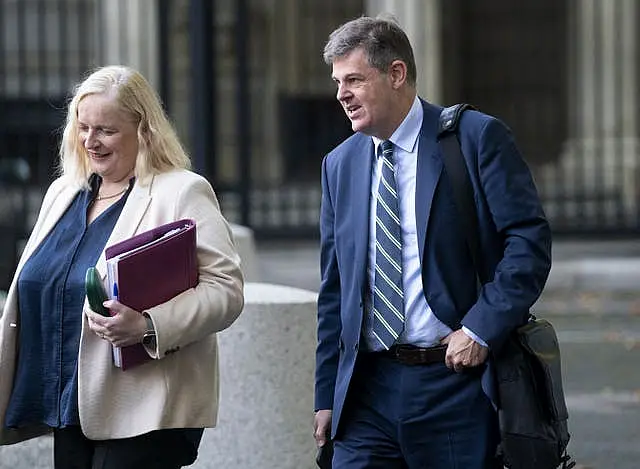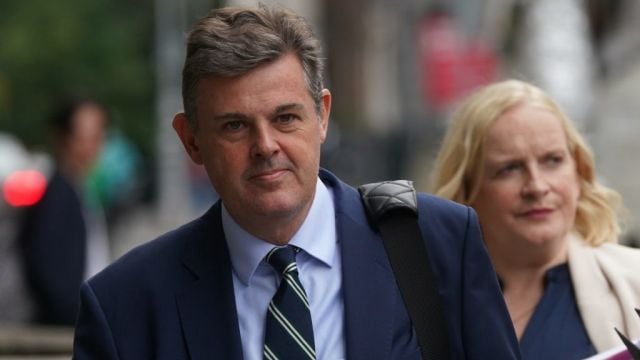RTÉ would become insolvent by early spring next year without additional funding from the Government, director general Kevin Bakhurst has warned.
Ministers are withholding €40 million, to plug a gap created by plummeting licence fee revenue, pending the delivery of a strategic reform plan from RTÉ.
The Oireachtas Public Accounts Committee was told RTÉ is facing a loss of between €10-12 million this year.
Members were told the national broadcaster has a cash reserve of around €68 million and has borrowed €65 million of its €100 million borrowing limit.

However, with a shortfall in TV licence revenue projected at €61 million across this year and next, Mr Bakhurst warned that the organisation would run out of cash if further funding was not made available.
“If we didn’t get this cash, we would run out of cash, that’s for sure,” Mr Bakhurst told the committee. “It is worrying.”
He was questioned by independent TD Verona Murphy, who asked whether RTÉ would become insolvent by early spring 2024 if the extra funding was not forthcoming. “Yes,” replied Mr Bakhurst.
He said RTÉ would remain solvent if it received the added funding from the Government and made its own cost-saving moves.
RTÉ was plunged into crisis in June when the broadcaster revealed it had not correctly declared fees to its then highest-paid earner, Ryan Tubridy.
The scandal widened as a series of other financial and governance issues emerged.
Earlier this year, prior to the emergence of controversies, RTÉ submitted a request for €34.5 million in additional interim funding for next year.
In response to that, Government has now allocated €16 million in extra funding for this year.
The state’s financial advice body, NewERA, recommended that funding amount.
However, since the initial request for additional funding, RTÉ’s revenues have taken a further major hit, with the broadcaster experiencing multimillion-euro losses due to a fall in TV licence payments in the wake of the controversies.

NewERA has also recommended an additional €40 million in relation to the shortfall of TV licences, but that is being withheld by Government pending delivery of RTÉ’s strategic reform plan.
The Government has also asked RTÉ to make €21 million of efficiencies to make up the gap created by the €61 million shortfall in licence fee revenue.
Mr Bakhurst welcomed the additional €16 million but stressed the need for wider reform of the funding model for public service media.
“It is critical that the funding of public service media in Ireland is put on a more stable footing,” he said.
“This not only affects RTÉ, but also the independent sector, to which RTÉ plays a very important role in sustaining and showcasing.
“I am determined that RTÉ will be transformed so that the public, Government and our partners can have full confidence in RTÉ, and its management.
“We understand that in order to achieve that we need to share a compelling and credible plan as to how the organisation must change.”
Mr Bakhurst said he hoped to provide an outline framework for strategic reform around the end of October, and said a more detailed and costed statement of strategy would be delivered by early next year.
Addressing the committee, Mr Bakhurst said selling parts of RTÉ’s south Dublin headquarters was still under consideration to create new revenue, but he said a full sale was “unlikely”.
“A strategic change of this scale requires considerable levels of financial modelling and deliberation,” he said.
“Among the elements being explored is the sale of more of the campus – an issue that I know several of you have expressed an interest in.
“We are awaiting more up-to-date valuations, but early indications are that a complete sale of the Donnybrook campus is unlikely, and the repurposing of the current site will not be without challenges and significant costs.
“We must rebuild an RTÉ that is trusted and enjoyed, one that’s relevant and loved, and one that brings the country together for important national moments and events.
“Public service content, value for money, and trust, will be at the heart of a transformed RTE, and I and my team are committed to the work required to deliver that.”
Mr Bakhurst has said the national broadcaster had reached a “turning point” in regard to its governance standards following the series of controversies.
He told PAC members he understood the urgency of restoring trust in the organisation.
He said recent moves to drive down costs had saved millions of euros.
“We are managing our finances carefully and working to cut costs in the face of declining revenue from the TV licence,” he said.
“Recent initiatives such as the freeze on recruitment of staff and stopping discretionary spending, alongside deferring some investment in digital and capital projects has saved several million euro.
“And RTE’S commercial performance has been good. While cash reserves are solid for the short term, clearly long-lasting reform of the broken funding system is urgently needed.”
During early committee stages, Mr Bakhurst was pressed on RTE’s refusal to provide a note of a meeting between former director general Dee Forbes and Noel Kelly, who is the agent of high-profile former presenter Tubridy. A legal representative was also present.
The meeting was central to a contentious commercial arrangement with a sponsor that saw RTE underwrite payments to Tubridy – a move that ultimately led to the organisation paying 150,000 euro to him when the sponsor choose not to renew the deal after one year.
RTE has cited client confidentiality as a reason for not disclosing the note to the committee.
Prior to Thursday’s meeting, committee chairman Brian Stanley warned that members could seek Oireachtas approval to compel the broadcaster to hand over the note.
Mr Bakhurst told members that as a “responsible organisation” RTE could not ignore the legal advice it had received on not disclosing the document to the committee.
Labour TD Alan Kelly suggested that if the committee was forced to compel RTE to disclose the note of the meeting involving Ms Forbes and Mr Kelly, and the matter subsequently ended up in court, Mr Bakhurst’s position as director general would become untenable.
Mr Kelly also pressed Mr Bakhurst on why RTE had not named its 100 highest-earning presenters in a list disclosing their salaries.
The director general said a legal opinion advised against naming the employees amid concerns over GDPR issues.
The resignation of RTE’s chief financial officer, Richard Collins, was announced on Wednesday.
Appearing before the committee, Mr Bakhurst was asked whether RTE had sought Mr Collins’ resignation and whether he had received a severance package.
Mr Bakhurst declined to answer those questions, insisting he could not speak about individuals.
The director general was also asked whether the reform plan would include any compulsory redundancies.
Mr Bakhurst said there were no plans for compulsory redundancies and said, if there were, that would require political approval.
“The Taoiseach and minister (Media Minister Catherine Martin) have both made clear there is no appetite for that,” he added.







